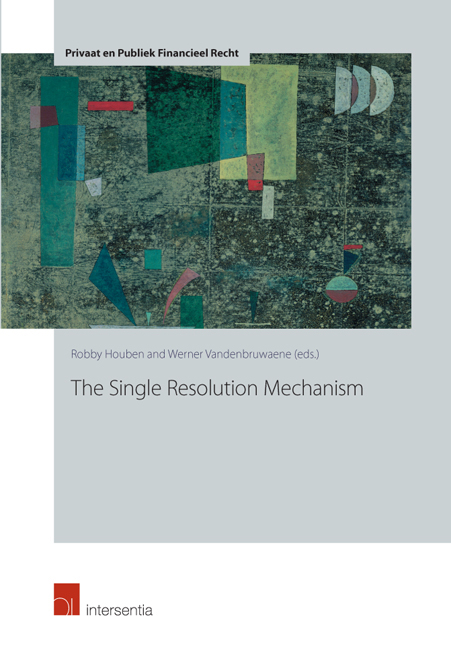Book contents
- Frontmatter
- Preface
- Contents
- Introduction: Recovery and Resolution, Future Solutions for Dealing with Insolvency
- The Single Resolution Mechanism. Institutional and Financing Arrangements for Bank Resolution in the European Banking Union
- Resolution from the Belgian Resolution Authority's Perspective
- Judicial Protection in the Single Resolution Mechanism
- The Rules on State Aid and the Framework for Bank Resolution: Foreplay and Interplay
- Concluding Remarks on Resolution and Resolvability Challenges
Judicial Protection in the Single Resolution Mechanism
Published online by Cambridge University Press: 25 September 2018
- Frontmatter
- Preface
- Contents
- Introduction: Recovery and Resolution, Future Solutions for Dealing with Insolvency
- The Single Resolution Mechanism. Institutional and Financing Arrangements for Bank Resolution in the European Banking Union
- Resolution from the Belgian Resolution Authority's Perspective
- Judicial Protection in the Single Resolution Mechanism
- The Rules on State Aid and the Framework for Bank Resolution: Foreplay and Interplay
- Concluding Remarks on Resolution and Resolvability Challenges
Summary
INTRODUCTION
The Single Resolution Mechanism (“SRM”) is operated by multiple authorities. The Single Resolution Board (“SRB”), the Single Resolution Fund (the “SRF”, which is owned by the SRB and does not have a separate legal personality) and the national resolution authorities of each of the 19 eurozone countries are its main actors. The ECB, the European Commission and the Council also have their role. This leads to an intricate regime of judicial review. Appeals against measures adopted under the SRM are handled, depending on the type and the origin of the measure, by the SRB's Appeal Panel, by the Court of Justice of the European Union (“CJEU”) or by national courts.
Recital 120 of the SRM Regulation outlines the organisation of the judicial review within the SRM:
The SRM brings together the Board, the Council, the Commission and the resolution authorities of the participating Member States. The Court of Justice has jurisdiction to review the legality of decisions adopted by the Board, the Council and the Commission, in accordance with Article 263 TFEU, as well as for determining their non-contractual liability. Furthermore, the Court of Justice has, in accordance with Article 267 TFEU, competence to give preliminary rulings upon request of national judicial authorities on the validity and interpretation of acts of the institutions, bodies or agencies of the Union. National judicial authorities should be competent, in accordance with their national law, to review the legality of decisions adopted by the resolution authorities of the participating Member States in the exercise of the powers conferred on them by this Regulation, as well as to determine their non-contractual liability.
The reality, as will be seen in this contribution, is more complex than recital 120 suggests.
THE APPEAL PANEL
The SRM Regulation sets up an Appeal Panel within the SRB, which offers to parties affected by certain types of decisions of the SRB a first layer of legal review prior to a possible appeal to the CJEU. This first review is intended to be simpler, faster and cheaper for appellants than legal proceedings at the CJEU. There is little formalism in the procedure, the appeal must in principle be decided within a month, parties need not be represented by outside counsel and no costs are charged to the appellant.
- Type
- Chapter
- Information
- The Single Resolution Mechanism , pp. 77 - 120Publisher: IntersentiaPrint publication year: 2017

